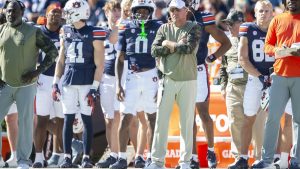“I’m relatively happy with it,” Kopecky cautiously began her interview with Sporza. “But of course, I race to win, for the highest achievable goal. At the Olympics, it’s a bit different. I’m just very happy not to be fourth, like I was three years ago. That’s the worst position to finish in. In the end, I feel like I’ve won bronze,” she said, feeling mostly positive after the race. Kopecky overcomes various obstacles to secure bronze Kopecky started the sprint for silver and bronze from the front, which was not her intention. “Yes, they forced me to take the lead, and I thought: I’m going to get tricked here. In the end, it was just enough,” said the relieved Belgian. A significant moment in the race was a crash at the foot of the first passage of Montmartre. Although Kopecky did not crash herself, she was held up. “I was feeling good and had to go. Otherwise, I wouldn’t have returned to the race. I had to use a lot of energy at that point,” she explained.
A determined Kopecky didn’t give up and fought her way back to the front. But she had to chase again soon after Vos and Vas broke away together. “I immediately felt it was over, especially because everyone started looking at each other. You also know that if you go all out to chase, you might not have enough left for the last climb up Montmartre, and you won’t close the gap.”
Thanks to an incredibly strong Faulkner, Kopecky managed to return. The American rode so hard that Kopecky quickly abandoned her own plans to attack. “I initially wanted to go from the foot of the climb myself, but Faulkner set a very hard pace. Eventually, we caught up to Blanka and Marianne together.” Faulkner, the slowest sprinter of the group, attacked three kilometers from the finish. It was the decisive move. “You know what a rider like Faulkner will do. And then you think to yourself, Marianne is the fastest, maybe she can bring her back. I don’t know if I could have responded myself. But once she was gone, I switched to fighting for the medals,” Kopecky concluded.





